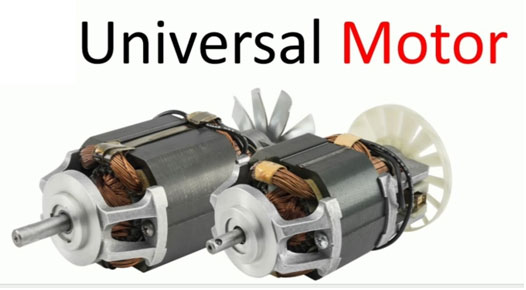The universal motor is the type of machine which is used to convert electrical energy into mechanical. This motor is capable of running both AC and DC power supplies. It is also known as a single-phase series motor.
Operation of Universal Motor
When fed with a DC supply
When the universal motor is fed with a DC supply, then it works as a DC series motor. In this case, when the current flows in the field winding, it produces an electromagnetic field. Besides same current flows in the armature conductors. When a current-carrying conductor is placed in a magnetic field, the conductor experiences a mechanical force and this mechanical force causes the rotor to rotate with the help of Fleming’s Left-hand rule which gives the direction of this force.
When fed with an AC supply
when the universal motor is supplied with AC power then unidirectional torque is produced. This is because the armature winding and the field winding are connected in series and in the same phase. Thus, whenever the polarity of the AC changes, the direction of the current in the armature as well as the field winding changes simultaneously. The direction of the magnetic field and the direction of armature current reverse so that the direction of force experienced by armature conductors remains the same. Hence, regardless of AC or DC supply, universal motors work on the same principle that DC series motors work on.
Advantages Of Universal Motor
- Due to simple construction Universal motors are less expensive as there is no requirement for permanent magnets.
- Universal motors provide good torque at low speeds. And rotate at high speed due to the connection of armature windings and field windings in series.
- Due to the presence of an electromagnetic field, Eddy current losses are reduced and heating is avoided.
- Universal motors require low power input to run the motor.
- These motors can run at whichever given availability speed.
Disadvantages Of Universal Motor
- Universal motors produce higher noise and this noise increases with the speed of the motor.
- Universal motor creates vibrations that may cause damage to the motor.
Application of Universal motor
- Universal motors are widely used in domestic appliances like Vacuum cleaners, Portabledrills, blenders, etc.
